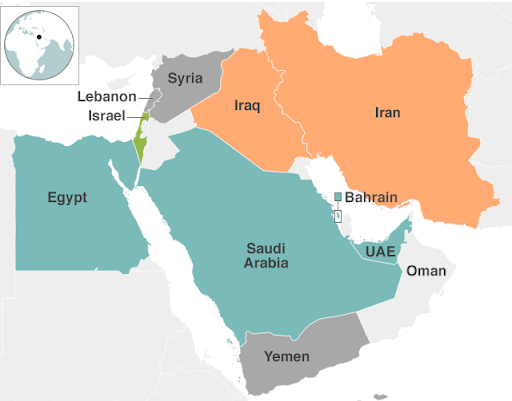International Relations
Israel Signs Free Trade Deal with UAE
- 02 Jun 2022
- 7 min read
For Prelims: Middle East countries, Gulf countries, Abraham Accord, FTA
For Mains: Trade Agreements, Bilateral Agreements, India- Israel relationships, Issues and Challenges in West Asia, Middle East
Why in News?
Recently, Israel signed a free trade deal with the United Arab Emirates, its first with an Arab country, building on their US-brokered normalization of relations in 2020.
- The UAE was the first Gulf country to normalize ties with Israel and only the third Arab nation to do so after Egypt and Jordan.
What are the Key Highlights?
- Trade between the Two Countries: In comparison to 2020, Israel's Central Bureau of Statistics recorded more than a 30% increase in import and export of goods, excluding diamonds, to and from the United Arab Emirates.
- Two-way trade in 2021 totaled some USD 900 million.
- Non-oil trade surpassed reached USD 1.06 billion in the first three months of 2022 - a fivefold increase from the same period last year.
- Significance of the Free Trade Deal:
- Builds on the US-brokered Normalisation of Relations: The deal shows the durability of a series of diplomatic deals in 2020 known as the Abraham Accords, which normalized relations between Israel and four Muslim countries—the U.A.E., Bahrain, Morocco and Sudan.
- Great Economic Potential:
- Israel's relationship with the UAE has great economic potential due to the geographic and cultural proximity between the peoples, as well as the UAE’s unique characteristics.
- The UAE is the second largest economy in the Arab world (after Saudi Arabia), with significant weight placed on technology products and advanced solutions, where Israel holds a relative advantage.
- Faster Access to Markets and Lower Tariffs:
- Businesses in both countries will benefit from faster access to markets and lower tariffs as these nations work together to increase trade, create jobs, promote new skills and deepen cooperation.
- The deal abolishes customs duties on 96% of the products exchanged between the two sides.
- The agreement also relates to regulatory and standardisation issues, customs, collaboration, government procurement, e-commerce and intellectual property rights.
- Boost up Trade:
- This deal will push the value of non-oil bilateral trade between Israel and the UAE beyond $10 billion.
- UAE-Israel trade will exceed $2 billion in 2022, rising to around $5 billion in five years, bolstered by collaboration in renewables, consumer goods, tourism and the life sciences sectors.
- Israel can Gain foothold in International Market:
- A long-term hope for both countries is that Israeli companies will set up manufacturing in the U.A.E., which serves as a hub for the Middle East, Asia and Africa—markets where Israel has struggled to gain a foothold.
What is the Significance for India?
- This agreement, jointly with the Comprehensive Economic Partnership Agreement (CEPA) signed between India and the UAE, has the potential for extensive trilateral cooperation and business partnerships.
- It has also further created opportunities for collaborations in different fields with the US.
- These were made possible by the Abraham Accords, which have been a significant turning point in promoting peace and prosperity for all.
- Israel, India, the UAE, and the US are also part of a new grouping, West Asian Quad which was established as a forum for economic cooperation.
- They are pursuing a constructive agenda focused on the economy, especially infrastructure projects.
What is a Free Trade Agreement?
- FTAs are arrangements between two or more countries or trading blocs that primarily agree to reduce or eliminate customs tariff and non-tariff barriers on substantial trade between them.
- FTAs normally cover trade in goods (such as agricultural or industrial products) or trade in services (such as banking, construction, trading etc.).
- FTAs can also cover other areas such as intellectual property rights (IPRs), investment, government procurement and competition policy etc.
- Example: India has negotiated FTA with many countries e.g. Sri Lanka and various trading blocs as well e.g. ASEAN.
- FTAs can be categorised as Preferential Trade Agreement, Comprehensive Economic Cooperation Agreement, Comprehensive Economic Partnership Agreement (CEPA).
Way Forward
- This trade agreement with Israel will create a new paradigm for the West Asian region, and represents the importance of building significant partnerships.
- This will offer significant diplomatic ties in the near future and help in overcoming the long conflicts in the Middle East region between Israel and many countries of West Asia.
UPSC Civil Services Examination, Previous Year Question
Q. Consider the following countries: (2018)
- Australia
- Canada
- China
- India
- Japan
- USA
Which of the above are among the ‘free-trade partners’ of ASEAN?
(a) 1, 2, 4 and 5
(b) 3, 4, 5 and 6
(c) 1, 3, 4 and 5
(d) 2, 3, 4 and 6
Ans: (c)
Exp:
- Association of Southeast Asian Nations (ASEAN) has free trade agreements with six partners, namely the People’s Republic of China, Republic of Korea, Japan, India as well as Australia and New Zealand. Hence,1, 3, 4 and 5 are correct.
- ASEAN was established on 8 August 1967 in Bangkok, Thailand, with the signing of the ASEAN.
- Declaration (Bangkok Declaration) by the founding fathers of ASEAN, namely Indonesia, Malaysia, Philippines, Singapore and Thailand. Brunei Darussalam joined on 7 January 1984, Vietnam on 28 July 1995, Lao PDR and Myanmar on 23 July 1997, and Cambodia on 30 April 1999, making up what is today the ten member states of ASEAN. Therefore, option (c) is the correct answer.





